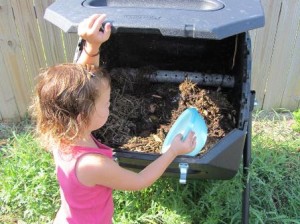 Wait! Don’t throw those eggs shells in the garbage can! Those make great compost! Call me “scrap happy,” but kitchen scraps are valuable to me. Rather than flushing them down the garbage disposal or tossing them into the garbage can, I put them in the tupperware bowl that sits next to the kitchen sink. In the bowl goes our coffee filters, coffee grinds, tea bags, egg shells, old bread, potato peels, apple cores, and whatever other fruit and veggie remains our family of five doesn’t eat in a day. About every other day, I dump the contents of the bowl into our compost bin.
Wait! Don’t throw those eggs shells in the garbage can! Those make great compost! Call me “scrap happy,” but kitchen scraps are valuable to me. Rather than flushing them down the garbage disposal or tossing them into the garbage can, I put them in the tupperware bowl that sits next to the kitchen sink. In the bowl goes our coffee filters, coffee grinds, tea bags, egg shells, old bread, potato peels, apple cores, and whatever other fruit and veggie remains our family of five doesn’t eat in a day. About every other day, I dump the contents of the bowl into our compost bin.
Our compost bin contains a collection of grass clippings, cow manure, weeds that I have pulled, kitchen scraps, and green and brown vegetation that have been removed from the garden. I keep the bin moist and turn it periodically to mix up the ingredients. Through the natural process of decomposition, my kitchen scraps and yard waste are transformed into a dark crumbly soil conditioner.
Composting can take anywhere from three weeks to nine months, depending upon several factors: the type of compost method you use, the type of organic matter added, temperature, and how often you turn the compost. When the compost is finished, the original material should not be recognizable. You will be left with a dark crumbly material. It’s a fascinating process that yields a free additive for my garden.
 Soil is the main ingredient vital to our gardening success and compost is the secret to transforming its physical condition. If you have clay soil, like me, the compost makes the soil more crumbly and easier to work with. If your soil is sandy, it will improve the soil’s ability to hold water and nutrients. If your soil is perfect, consider yourself lucky! Even perfect soil will benefit from a dose of the organic matter created through composting.
Soil is the main ingredient vital to our gardening success and compost is the secret to transforming its physical condition. If you have clay soil, like me, the compost makes the soil more crumbly and easier to work with. If your soil is sandy, it will improve the soil’s ability to hold water and nutrients. If your soil is perfect, consider yourself lucky! Even perfect soil will benefit from a dose of the organic matter created through composting.
Compost contains valuable nutrients, but should not be considered a fertilizer. To receive maximum growth and yield from your soil, it is necessary to test your soil and apply additional fertilizer.
To improve your soil, add compost to your garden every year. Compost can also be beneficial when you are planting trees and shrubs, used as mulch, or used as a top dressing for your lawn. I can speak from experience: I have been gardening in clay soil for eight years and have been amending the soil with compost every year. I definitely see an improvement. The soil is easier to work with, drains better, and produces healthier plants that yield bigger vegetables. Yum!
So, what are you doing with your kitchen scraps? Reconsider your kitchen habits; there is garden value in that garbage.





